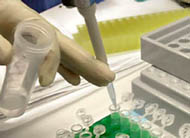Vaccine to protect against cervical cancer approved
Women got the first vaccine Thursday to protect them against cervical cancer, a disease that kills hundreds of thousands of women each year worldwide.

The U.S. Food and Drug Administration approved use of the vaccine, Gardasil, for use in girls and women ages 9 to 26. It works by preventing infection by four strains of the human papillomavirus, or HPV, the most prevalent sexually transmitted disease.
Gardasil, manufactured by Merck and Co. Inc., protects against the two types of HPV responsible for about 70 percent of cervical cancer cases. The vaccine also blocks infection by two other strains responsible for 90 percent of genital wart cases.
Clinical trials showed Gardasil prevented 100 percent of cervical cancer related to the two HPV strains in women who had not been previously infected, Merck said, reports AP.
According to New York Times, cervical cancer is the second-leading cause of death in women across the globe, affecting an estimated 500,000 women and killing 300,000 each year.
Widespread use of Pap smears in the developing world has reduced its toll there. In the United States, about 10,000 women contract cervical cancer each year, and some 3,700 die from it.
But the vaccine's high price and religious objections to its use by young girls could blunt its benefits. Merck, its maker, said that it will charge $120 for each of the three shots needed. Since cervical cancer is mostly a disease of the poor, that price could put it out of reach of most poor countries and even some in the United States.
A federal program will likely provide the vaccine to 45 percent of the children for whom it is recommended. But state programs that cover other children are often unable to buy newer, more expensive vaccines.
"Increasingly, states are asked to make a Sophie's choice about which diseases they will allow children to be hospitalized or killed by," said Dr. Paul Offit, director of infectious diseases at the Children's Hospital of Philadelphia.
If all women were screened regularly, we wouldn't need a vaccine.
In Merck's trials involving about 20,000 girls and young women, the HPV vaccine eliminated all major cervical infections caused by the two strains of the human papillomavirus that cause 70 percent of cervical cancers. Merck is using a version of a vaccine, developed at the National Cancer Institute, which was cloned in viruses grown in a caterpillar-cell culture. It also seems to prevent vaginal cancers caused by these highly carcinogenic viruses and prevents genital warts caused by HPV 11 and HPV 6, two other strains contained in the vaccine.
Along with Merck, however, GlaxoSmithKline hopes to license a human papilloma vaccine, with approval slated for January. Schiller hopes that eventually the two firms' competition will lower prices and that the companies will engage in a beneficial "arms race," adding protection from additional lethal strains of HPV as they battle for market share. At the same time, Schiller is helping two Indian companies make cheaper versions of the vaccine for developing countries.
In the end, the HPV vaccine should prove a worthy addition to the cause of fighting cancer. So, it will be worth it to suck up the cost—and be patient about seeing results, reports Slate.
O.Ch.
Subscribe to Pravda.Ru Telegram channel, Facebook, RSS!





